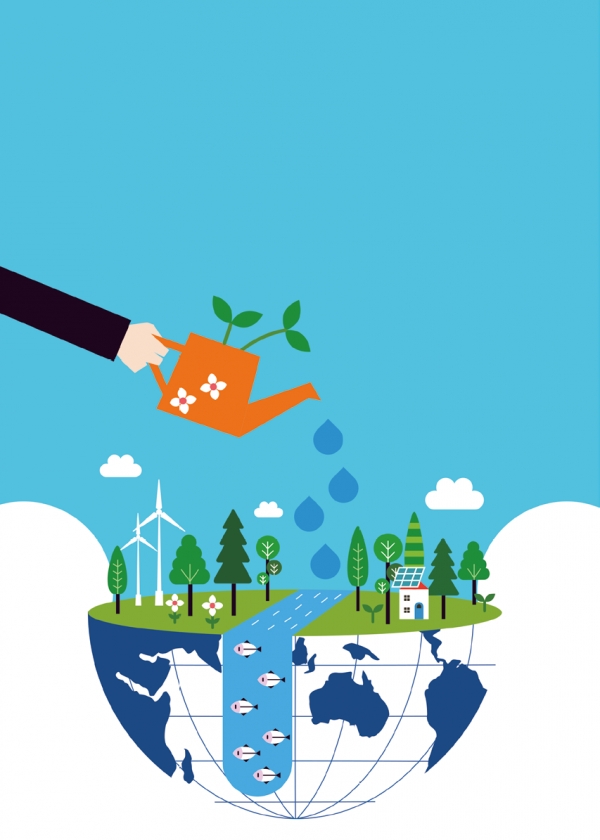If you live in a developed country, you have easy access to water. In doing so, it
is easy not to appreciate the importance of water in daily life. Water might seem
ubiquitous. For example, you can turn on the tap, flush the toilet without a problem,
and buy a bottle of drinking water for only five hundred won. However, the
insufficiency of clean water is one of the biggest problems that the United Nations (UN)
wants to solve. They even designated an annual special day called ‘World Water Day.’
‘World Water Day’ was first proposed at the 1992 United Nations Conference on
Environmental and Development in Rio de Janeiro; promulgated at the UN General
Assembly in the same year. It is a day to encourage and promote sustainable
management of fresh water resources, having annually changing themes, which are all
involved with WASH (clean water, sanitation, hygiene). However, some of you might
think it is ridiculous to designate a day for something so mundane.
Clean water costs are considerably expensive all over the world. According to
a survey done by the World Health Organization (WHO) and the United Nations
International Children's Emergency Fund (UNICEF), 660 million people are unable
to access improved source of drinking water and 250 million people live without
basic sanitation service globally. Another statistic from the UN shows that the lack of
sanitation services and clean water causes cholera and diarrhea. Moreover, an article
by UN News states that approximately 1.5 million kids die from water-sanitation
18
Focus of the Month
problems and 400 million school days are lost every year. The problem is so serious
that the UN General Assembly acknowledged the Human Right to Water and
Sanitation (HRWS) as a human right in 2010. Global suffering makes a reason strong
enough for you to care about ‘World Water Day.’ However, there are other reasons
to pay attention to this day if you are a reader of KT, not to mention the faculties and
students of Kyungnam University (KU).
WASH issues are deeply connected with environmental
issues. Changwon City, where KU is situated, is
the environmental capital of South Korea;
meaning, it is the most innovative in terms
of environmental policy. It has numerous
resources to keep eco-friendliness and
sustainable development (e.g., NUBIJA— Nearby
Useful Bike, Interesting Joyful Attraction). These days, sharing resources and strong
infrastructure support is common throughout the country. In cities like Changwon,
their public bicycles, scooters, and open sidewalks allow people to participate in this
environmental endeavor. NUBIJA’s official website states that the purpose of the
NUBIJA program is because rapidly industrialized society and a steeply increasing
number of cars lead to huge contamination as much as the utility of them. The
program began in 2004 and was appreciated as the best feat of Park Wan-su (exmayor
of Changwon). The city expanded its service areas to Masan and Jinhae in 2011
(Then, the three cities were separated, but now they are incorporated into one city,
Changwon). Nowadays, bicycles can be seen anywhere in Changwon City, providing
convenient transportation for students and citizens.
Changwon was also the host city of the 2018 Conference of the Parties to the
Convention on Wetlands or Ramsar COP10, which was held under the topic of
“wetlands and human health, well-being.” Ramsar Convention is an international treaty
for preserving and protecting wetlands. There are 24 wetlands on the List of Ramsar
Wetlands of International Importance in South Korea. Ramsar COP10 was attended
by 2,200 people from 165 countries and international and non-governmental
organizations around the world. It was an event that well represented the eco-friendly
policy of Changwon, the most advanced environmental city in Korea.
Another event that well shows the successful
environmental policy is the Changwon Environmental
Forum. Lee Chan-won, professor of the Department
of Environment and Energy Engineering at KU and
ex-chairperson of said committee had worked as the
representative of Changwon Environmental Capital
Forum. The forum consisted of environmental and urban
engineering experts, academics, and entrepreneurs;
who discussed environmental policies of the city of
Changwon such as public bicycles, environmental urban
planning, usage of rainwater, and more. He worked
hard to establish a path to designate Changwon as the
environmental capital. During his tenure, he uploaded
high-quality research papers to academic journals globally
and conducted various research projects commissioned
by many environment protection groups.
For this year, the topic of the ‘World Water Day’ is
“Groundwater, Making the Invisible Visible.” While the
importance of groundwater will increase in the future
due to climate change, the increasing public awareness
has been lackluster. The topic focuses on attracting the
attention of the public to groundwater and welcomes all
those who want to support this movement. If you want
to help achieve the goal of the day, here is a good way.
Upload how groundwater affects your life on your social
media with a hashtag #WorldWaterDay. By posting, you
can help people who lack clean water and sanitation and
attain the goal of sustainable development.


